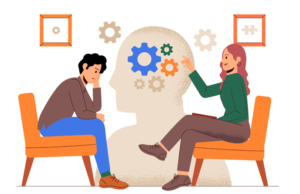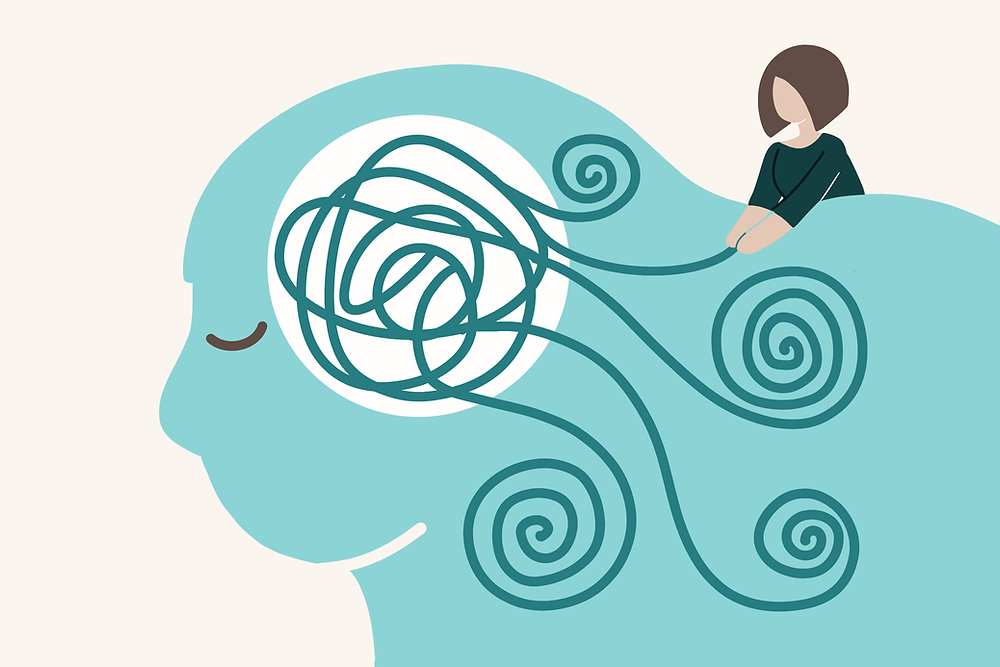Depression, a debilitating mental health disorder, touches the lives of countless individuals worldwide. Its shadows can cloud one’s perspective, making life seem bleak and hopeless. But amidst the darkness, hope emerges in the form of therapeutic interventions. One such beacon is Cognitive Behavioral Therapy (CBT). This guide aims to demystify CBT for depression, providing insight into its foundations, techniques, and transformative potential.
Contents
How Does Cognitive Behavioral Therapy For Depression Help?
 Cognitive Behavioral Therapy (CBT) is one of the most extensively researched and widely adopted therapeutic interventions for depression. Here’s a breakdown of how CBT helps individuals with depression:
Cognitive Behavioral Therapy (CBT) is one of the most extensively researched and widely adopted therapeutic interventions for depression. Here’s a breakdown of how CBT helps individuals with depression:
- Addresses Negative Thought Patterns
At the heart of CBT is the understanding that our thoughts, emotions, and behaviors are interconnected. Depression often fosters distorted, negative thought patterns. CBT helps individuals recognize and challenge these automatic negative thoughts.
- Teaches Coping Mechanisms
CBT imparts various strategies to cope with distressing situations and emotions. These coping tools can be especially valuable in moments of crisis or heightened stress, helping prevent or mitigate depressive episodes.
- Provides Structure
The structured nature of CBT sessions can be inherently therapeutic for individuals with depression. This structure can bring a sense of purpose and direction, especially when depressive symptoms feel overwhelming.
- Behavioral Activation
Depression can lead to avoidance of activities, including those that once brought pleasure. CBT promotes behavioral activation, encouraging individuals to engage in activities that boost mood and break the cycle of inactivity and despondency.
- Problem-solving Skills
CBT equips individuals with problem-solving skills, allowing them to tackle daily challenges more effectively and reduce feelings of helplessness.
- Enhances Self-awareness
Engaging in CBT fosters a deeper understanding of oneself, one’s triggers, and reactions. This self-awareness can be pivotal in preventing the onset or recurrence of depressive episodes.
- Short-term and Goal-oriented
CBT is typically a short-term therapy, making it both cost-effective and efficient. The goal-oriented nature ensures that individuals work towards tangible outcomes. This can be motivating.
Therefore, CBT for depression provides individuals with practical tools to challenge and change dysfunctional thought patterns and behaviors. By doing so, it promotes healthier thinking and behavioral patterns, equips individuals with coping mechanisms, and fosters resilience against future depressive episodes.
What Techniques Are Used In CBT For Depression?
 Cognitive Behavioral Therapy for depression incorporates a variety of techniques tailored to address the unique needs and symptoms of each individual. Several key techniques and strategies are commonly employed:
Cognitive Behavioral Therapy for depression incorporates a variety of techniques tailored to address the unique needs and symptoms of each individual. Several key techniques and strategies are commonly employed:
Cognitive Restructuring
This involves identifying and challenging negative thought patterns and then replacing them with more balanced or positive ones. For instance, a person believing “I’m a failure” might be guided to identify evidence against this belief and develop a more nuanced view.
Behavioral Activation
Aimed at helping individuals engage in activities they’ve been avoiding due to depression. By gradually increasing engagement in positive activities, individuals can experience improved mood.
Thought Records
Clients are taught to maintain a diary or log of their negative thoughts. Over time, they learn to recognize patterns, challenge these thoughts, and replace them with healthier alternatives.
Exposure Therapy
Though more commonly associated with anxiety disorders, this technique can be helpful for individuals with depression who are avoiding certain situations. It involves gradually and systematically confronting these situations to reduce fear and avoidance.
Relaxation Techniques
Deep breathing, progressive muscle relaxation, and guided imagery can be used to counteract the physical symptoms of anxiety and stress that often accompany depression.
Pleasure Prediction
Clients rate how much pleasure they predict they will receive from an activity and then rate the actual pleasure after completing it. This can counteract the tendency of depression to underestimate the potential for positive experiences.
Assertiveness Training
Helps individuals communicate more effectively, express their needs, and set boundaries, which can be essential for those who struggle with low self-esteem or feelings of helplessness.
Psychoeducation
Educating clients about depression, its causes, and the mechanics of CBT. Understanding the disorder can be empowering and can motivate adherence to treatment.
Remember, while these techniques are commonly used in CBT for depression, the specific strategies a therapist chooses will be based on the individual’s unique situation, needs, and goals. It’s a collaborative process, and therapists will often adjust their approach based on feedback and progress.
Who Is CBT Not Suitable For?
While Cognitive Behavioral Therapy (CBT) is a versatile and effective treatment for many individuals, it may not be suitable for everyone. Here are some scenarios or groups of people for whom CBT might not be the most appropriate choice:
- Severe Mental Health Disorders: Those with severe mental health disorders such as severe depression, bipolar disorder, or psychosis may require more intensive therapies or a combination of treatments including medication.
- Cognitive Impairments: CBT requires cognitive engagement for activities such as introspection, homework, and cognitive restructuring. Those with significant cognitive impairments or certain neurocognitive disorders might find it challenging to participate fully in CBT.
- Lack of Motivation: CBT is an active, participatory form of therapy. Individuals who aren’t motivated to engage in the process, complete homework, or implement new strategies might not benefit as much from CBT.
- Preference for Other Therapies: Some people might simply prefer other therapeutic approaches, such as psychodynamic therapy, humanistic therapy, or group therapy, based on their personal beliefs, previous experiences, or specific needs.
- Young Children: Traditional CBT might not be suitable for very young children due to the cognitive demands of the therapy. However, modified forms of CBT designed for children, often involving play and family participation, can be effective.
- Complex Trauma: While CBT can be beneficial for trauma and PTSD, those with complex trauma or multiple traumatic events might benefit from therapies specially designed for trauma, like EMDR or trauma-focused CBT.
It’s essential to remember that the decision about the suitability of CBT, or any therapy, should be made on an individual basis. Consulting with mental health professionals can help determine the best therapeutic approach for an individual’s unique situation and needs.
How To Find Cognitive Behavioral Therapy For Depression?
 Finding the right Cognitive Behavioral Therapy for depression can be crucial for successful treatment. Here are steps and tips to help you:
Finding the right Cognitive Behavioral Therapy for depression can be crucial for successful treatment. Here are steps and tips to help you:
- Consult Your Primary Care Physician
Your primary care doctor can often provide a referral or recommendation for local CBT therapists or clinics specializing in mental health.
- Licensed Mental Health Professionals
When seeking a CBT therapist, ensure they are licensed. This could be a licensed psychologist (Ph.D. or Psy.D.), licensed clinical social worker (LCSW), licensed professional counselor (LPC), or psychiatrist (M.D. or D.O.).
- CBT Certification
While licensure is essential, specialized training in CBT can be an added advantage. Some therapists receive certification in CBT through recognized organizations, indicating advanced training.
- Specialized Directories
The Association for Behavioral and Cognitive Therapies (ABCT) has a “Find a CBT Therapist” directory.
- Telehealth and Online Platforms
With advances in technology, many platforms offer online CBT. This can be particularly useful for those in remote areas, those with mobility issues, or during situations like pandemics.
- Insurance Providers
If you have health insurance, your provider may have a list of in-network therapists trained in CBT. Seeing an in-network therapist can often reduce out-of-pocket costs.
- Group Therapy
Some therapists and organizations offer CBT in a group setting. This can be an effective and often more affordable alternative to individual therapy.
- Ask for Recommendations
Friends, family, or colleagues who have undergone therapy might offer personal recommendations. Always ensure that you’re comfortable with your choice, irrespective of recommendations.
Questions to Ask
- What is your experience in treating depression with CBT?
- Do you have certification or specialized training in CBT?
- How do you typically structure your sessions?
- What is your approach to homework assignments in CBT?
- Can you provide any references or testimonials?
Remember, the effectiveness of CBT is not solely based on the therapy itself but also on the relationship and trust between the therapist and client. It’s vital to find a therapist with whom you feel comfortable and understood.
Conclusion
In the complex realm of mental health, Cognitive Behavioral Therapy for depression emerges as a beacon of hope. This evidence-based approach, rooted in the intricate interplay of thoughts, emotions, and behaviors, offers a structured path to healing. While CBT is versatile and widely effective, it’s essential to understand its techniques, recognize its suitability for each individual, and find the right therapist to ensure a successful therapeutic journey.
As with any therapeutic endeavor, personal commitment, and informed choices play a pivotal role in reclaiming one’s well-being and navigating the path to a brighter, more balanced future. If you are experiencing depression-related issues, Online Depression Counseling in India at TherapyMantra can help: Book a trial Online therapy session


